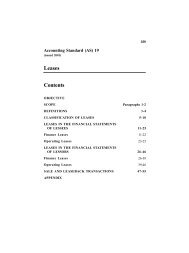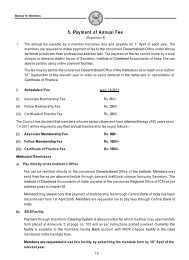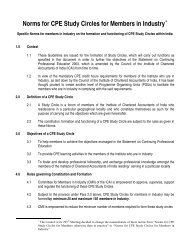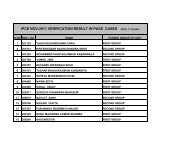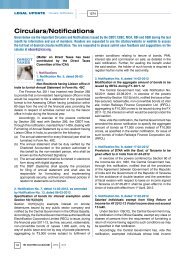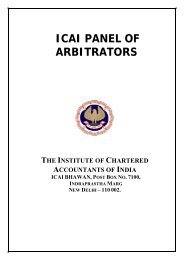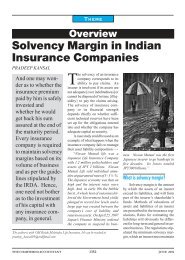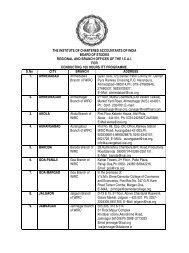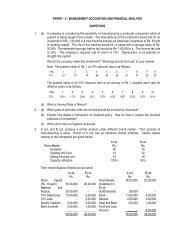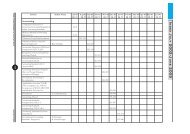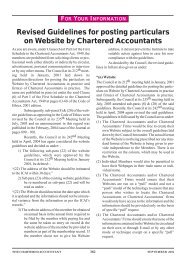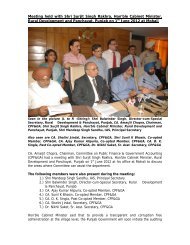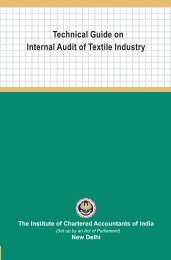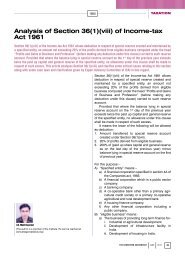The Chartered Accountant
The Chartered Accountant
The Chartered Accountant
Create successful ePaper yourself
Turn your PDF publications into a flip-book with our unique Google optimized e-Paper software.
22. For practical purposes, when services<br />
are performed by an indeterminate<br />
number of acts over a specified<br />
time frame, revenue is recognised on<br />
a straight line basis over the specified<br />
time frame unless there is evidence<br />
that some other method better represents<br />
the stage of completion. When<br />
a specific act is much more significant<br />
than any other acts, the recognition of<br />
revenue is postponed until the significant<br />
act is executed.<br />
23. When the outcome of the transaction<br />
involving the rendering of<br />
services cannot be estimated reliably,<br />
revenue should be recognised<br />
only to the extent of the expenses<br />
recognised that are recoverable.<br />
24. During the early stages of a transaction,<br />
it is often the case that the<br />
outcome of the transaction cannot<br />
be estimated reliably. Nevertheless,<br />
it may be probable that the entity will<br />
recover the transaction costs incurred.<br />
<strong>The</strong>refore, revenue is recognised only<br />
to the extent of costs incurred that<br />
are expected to recoverable. As the<br />
outcome of the transaction cannot be<br />
estimated reliably, no surplus is recognised.<br />
25. When the outcome of a transaction<br />
cannot be estimated reliably and<br />
it is not probable that the costs incurred<br />
will be recovered, revenue is<br />
not recognised and the costs incurred<br />
are recognised as an expense. When<br />
the uncertainties that prevented the<br />
outcome of the contract being estimated<br />
reliably no longer exist, revenue<br />
is recognised in accordance with paragraph<br />
17 rather than in accordance<br />
with paragraph 23.<br />
Sale of Goods<br />
26. Revenue from the sale of goods<br />
should be recognised when all the<br />
following conditions have been<br />
satisfied:<br />
(a) <strong>The</strong> entity has transferred<br />
to the purchaser the significant<br />
risks and rewards of<br />
ownership of the goods;<br />
(b) <strong>The</strong> entity retains neither<br />
continuing managerial involvement<br />
to the degree<br />
usually associated with<br />
STANDARDS<br />
ownership nor effective<br />
(c)<br />
control over the goods sold;<br />
<strong>The</strong> amount of revenue can<br />
be measured reliably;<br />
(d) It is probable that the economic<br />
benefits or service<br />
potential associated with<br />
the transaction will flow to<br />
the entity; and<br />
(e) <strong>The</strong> costs incurred or to be<br />
incurred in respect of the<br />
transaction can be measured<br />
reliably.<br />
27. <strong>The</strong> assessment of when an entity<br />
has transferred the significant risks<br />
and rewards of ownership to the purchaser<br />
requires an examination of the<br />
circumstances of the transaction. In<br />
most cases, the transfer of the risks<br />
and rewards of ownership coincides<br />
with the transfer of the legal title or<br />
the passing of possession to the purchaser.<br />
This is the case for most sales.<br />
However, in certain other cases, the<br />
transfer of risks and rewards of ownership<br />
occurs at a different time from<br />
the transfer of legal title or the passing<br />
of possession.<br />
28. If the entity retains significant<br />
risks of ownership, the transaction is<br />
not a sale and revenue is not recognised.<br />
An entity may retain a significant<br />
risk of ownership in a number of<br />
ways. Examples of situations in which<br />
the entity may retain the significant<br />
risks and rewards of ownership are:<br />
(a) When the entity retains an<br />
obligation for unsatisfactory<br />
performance not covered by<br />
normal warranty provisions;<br />
(b) When the receipt of the revenue<br />
from a particular sale is<br />
contingent on the derivation<br />
of revenue by the purchaser<br />
from its sale of the goods (for<br />
example, where a local body<br />
distributes educational material<br />
to schools on a sale or return<br />
basis);<br />
(c) When the goods are shipped<br />
subject to installation and the<br />
installation is a significant part<br />
of the contract which has not<br />
yet been completed by the en-<br />
tity; and<br />
(d) When the purchaser has the<br />
right to rescind the purchase<br />
for a reason specified in the<br />
sales contract and the entity is<br />
uncertain about the probability<br />
of return.<br />
29. If an entity retains only an insignificant<br />
risk of ownership, the transaction<br />
is a sale and revenue is recognised.<br />
For example, a seller may retain the legal<br />
title to the goods solely to protect<br />
the collectability of the amount due.<br />
In such a case, if the entity has transferred<br />
the significant risks and rewards<br />
of ownership, the transaction is a sale<br />
and revenue is recognised. Another<br />
example of an entity retaining only an<br />
insignificant risk of ownership may be<br />
a sale when a refund is offered if the<br />
purchaser is not satisfied. Revenue in<br />
such cases is recognised at the time of<br />
sale provided the seller can reliably estimate<br />
future returns and recognises a<br />
liability for returns based on previous<br />
experience and other relevant factors.<br />
30. Revenue is recognised only when it<br />
is probable that the economic benefits<br />
or service potential associated with<br />
the transaction will flow to the entity.<br />
In some cases, this may not be probable<br />
until the consideration is received<br />
or until an uncertainty is removed.<br />
For example, the revenue may be dependent<br />
upon the ability of another<br />
entity to supply goods as part of the<br />
contract and if there is any doubt that<br />
this will occur, recognition may be delayed<br />
until it has occurred. When the<br />
goods are supplied, the uncertainty is<br />
removed and revenue is recognised.<br />
However, when an uncertainty arises<br />
about the collectability of an amount<br />
already included in revenue, the uncollectable<br />
amount, or the amount in<br />
respect of which recovery has ceased<br />
to be probable, is recognised as an expense,<br />
rather than as an adjustment of<br />
the amount of revenue originally recognised.<br />
Interest, Royalties and Dividends<br />
31. Revenue arising from the use<br />
by others of entity assets yielding<br />
interest, royalties and dividends<br />
should be recognised using the<br />
THE CHARTERED ACCOUNTANT 1075 DECEMBER 2008



